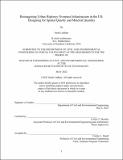Reimagining Urban Highway Overpass Infrastructure in the US: Designing for Spatial Quality and Material Quantity
Author(s)
Ladhani, Sarah
DownloadThesis PDF (13.90Mb)
Advisor
Mueller, Caitlin T.
Terms of use
Metadata
Show full item recordAbstract
The United States’ aging transportation infrastructure requires over a third of its bridges to be repaired or replaced. This provides an opportunity to reconsider urban highway overpasses by designing for the communities through which they run and reducing global carbon emissions that the construction industry is responsible for. This thesis explores the undercroft spaces of highway overpasses in urban areas and proposes quantitative metrics to describe qualitative spaces. It also reimagines reinforced concrete hammerhead pier design using topology optimization to generate more efficient piers caps that would require less material and contain less embodied carbon. The study finds that additional complexity of an optimized result does not correlate to significant material savings, however even simpler optimized results are more efficient than traditional designs. The study emphasizes underutilized undercroft spaces in urban environments and explores pier typologies based on topology optimization.
Date issued
2022-05Department
Massachusetts Institute of Technology. Department of Civil and Environmental EngineeringPublisher
Massachusetts Institute of Technology